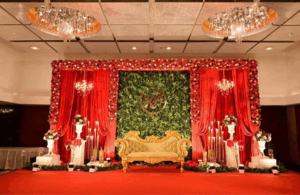
Did you know that planned marriages make up to 55% of marriages globally? It may seem ancient to think of arranged weddings in a world where you can swipe right and left and have an infinite number of alternatives at your fingers. Nonetheless, arranged weddings are still widely practiced in several regions of the world and have long been a feature of many civilizations around the world, acting as a pillar of custom and social structure. Let’s get started!
An arranged marriage: what is it?
When the bride and groom are chosen by their families or other outside parties instead of by themselves, it’s known as an arranged marriage.
In this kind of marriage, families and kundali matching by name and date of birth play a major part in selecting the right spouse for their son or daughter based on social position, compatibility, religion, caste, or financial concerns, as opposed to a traditional love marriage where both parties take the lead.
After a match has been found, the couple can come together and get to know one another before getting married, but families still frequently decide whether or not to get married, though this is starting to change.
In many societies around the world, arranged weddings continue to be very common. In India, for example, over 90% of weddings are arranged.
The Advantages of an Arranged Marriage
Even though planned weddings are sometimes misunderstood, there are definite advantages that have kept this custom alive. What advantages do these marriage arrangements offer, then?
Cultural Preservation
Arranged marriages are essential to preserving cultural values and history. Arranged marriages ensure the safeguarding of cultural identity by upholding long-standing matchmaking conventions, which in turn help to preserve family and social traditions.
Family Involvement
The active involvement of the family in the matching process is a crucial aspect of planned marriages. Parents, siblings, and other family members work together to support these kinds of marriages, forming a network of support that follows couples through their married life.
Social Stability
Arranged marriages act as a stabilizing force in societies where they are practiced, upholding long-standing social norms and structures while fostering community cohesion and order.
Shared Values and Backgrounds
When two people are tied in an arranged marriage, they prioritize sharing similar values and backgrounds, which strengthens their bond. Knowing each other’s basic beliefs at the beginning of a journey increases the likelihood that a pair will be able to work through issues together. If two people in a love marriage discover they have extremely different values after they have already committed to one another, it can be difficult and they may need to put in a lot of effort to reconcile. By considering their values while pairing them, families sometimes help arranged marriage couples find one another. This increases the likelihood of the couple’s long-term happiness together.
The Disadvantages of Arranged Marriages
Despite the benefits of arranged marriages, there are always issues that should be considered.
Compatibility
The first concern on the list is compatibility, which can provide serious challenges for couples getting married in an arranged marriage. Arranged weddings may place more importance on elements like caste, family background, or socioeconomic standing than on personal compatibility, which can result in personality and value clashes between spouses.
Lack of Individual Freedom
In addition, people in arranged marriages may suffer from the pressure to live up to social and familial standards. When individual freedom is limited during the mate-selecting process, feelings of bitterness or unmet wishes may surface.
Lack of Trust
In the early stages of a relationship, a lack of dates and time to get to know one another can lead to mistrust. Attempts have been made recently to empower people in arranged marriages and solve these issues. Although they are still in their infancy, premarital counseling and compatibility tests are meant to help couples make better decisions and communicate with each other.
Conclusion:
Arranged weddings have the world’s lowest divorce percentages! Furthermore, arranged marriages are still a common practice in many cultures, with benefits and drawbacks for everybody involved. People can handle arranged marriages with clarity and confidence, opening the door to happy and long-lasting partnerships, by being aware of the dynamics, communicating openly throughout the process, and making well-informed decisions. You can have an online chat with astrologer for free to know if you will have a love marriage or an arranged marriage.





